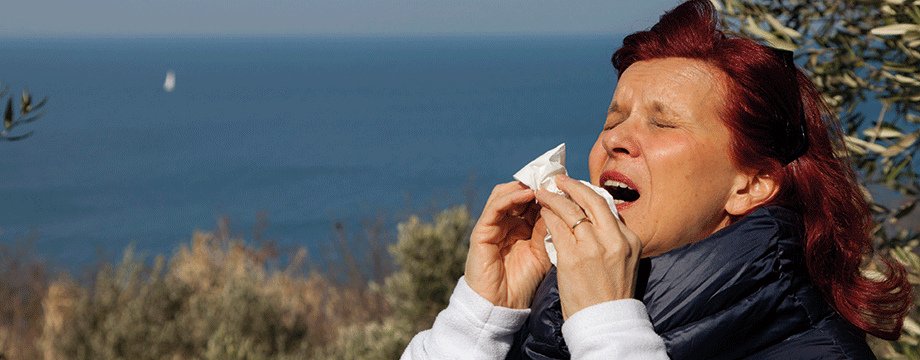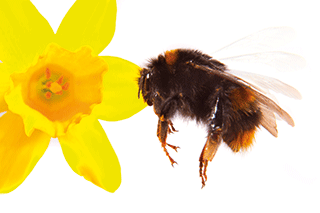Hay fever SOS!

Keep the dreaded hay fever symptoms at bay with our top natural tips
Hay fever, also known as seasonal allergic rhinitis, is thought to affect nearly 18 million people in the UK, according to estimates from the charity Allergy UK. With symptoms ranging from sneezing and a blocked or runny nose to itchy eyes, nose and throat, it can be a pretty miserable condition for sufferers.
“Hay fever is a type of inflammation of the nose, which occurs when the immune system over-reacts to allergens such as pollen in the air,” explains Clare Daley, a nutritional therapist with Nature’s Own (www.natures-own.co.uk). “IgE antibodies, which are produced in large quantities when an allergen is first encountered, attach to mast cells. Then, when the allergen is encountered again, it attaches to these antibodies triggering the mast cells to release inflammatory chemicals like histamine; this is called degranulation.”
“Even if hay fever symptoms are mild, they can be irritating and interfere with everyday life at home, work and school,” says Ellie Hughes, UK marketing director at natural Swiss eye care range, Similasan. “People who suffer from year round (perennial) allergies tend to react to allergens found indoors. This could be anything from certain foods, house dust mites and perfume, to feathers, pets, animal dander or mould. Seasonal allergies, like hay fever, are typically aggravated by tree pollens in spring, by grass and weed pollens during the summer, weeds in autumn and fungal spores from late March to November, but these can also be present year round. Some of us may be more predisposed to hay fever especially if we are born into a family where allergies exist. However there are ways to reduce our risk of hay fever flare-ups and manage symptoms. To reduce irritating hay fever symptoms, it’s really important for allergy sufferers to look at ways of reducing exposure to known allergens and to effectively manage their symptoms.”
Symptom check
Itchy, watery eyes
Try this: “Wear wraparound sunglasses outdoors to stop pollen getting in your eyes,” says Ellie Hughes. “Use a natural, pH balanced eye drop range specifically formulated to provide quick relief from itchy, irritated and sore eyes caused by allergies and hay fever. The cleansing action of the eye drops also helps to wash pollen spores from the eyes. Natural eye drops are ideal as they can be used as often as required throughout the day, and they are ideal for children over the age of two years. Eye drops in a small, convenient 10 ml bottle are handy for when you are out and about.”
Runny nose
Try this: The inflammation that hay fever sufferers experience causes an increased production of mucus as the nose tries to get rid of the offending allergen. “A diet high in sugar, bad fats and low in vegetables is inflammatory and will encourage the immune system to over-react,” explains Claire Daley. “Conversely an anti-inflammatory diet that is low in sugar, high in vegetables with good quality fats (olive oil, avocado or oily fish) will reduce hay fever. The gut is also key – there is lots of research linking the health of the gut and the gut bacteria to hay fever. Foods that encourage friendly gut bacteria include dark, green leafy vegetables, onions, leeks, apples and dark chocolate (70%). Research has also shown reduced symptoms from regularly taking a native friendly bacteria supplement.”
Persistent sneezing
Try this: “Try doing an aromatherapy inhalation morning and night – especially if you are coughing and sneezing,” says Joannah Metcalfe, consultant aromatherapist with Base Formula (www.baseformula.com). “Add two drops of rose essential oil, one drop of eucalyptus and one drop of Roman chamomile to a bowl of steaming hot water. Lean over the bowl and place a towel over your head to enclose the steam. Breathe in deeply for five minutes with your eyes closed. This is the most powerful way of delivering the essential oils’ decongestant and anti-inflammatory properties straight to the problem zone. You can also vaporise two drops of eucalyptus essential oil, two drops of melissa and four drops of tea tree in an aromatherapy diffuser throughout the day.”
Tips from the hive

A simple – and tasty – way of tackling your hay fever symptoms is by consuming some local honey which contains trace elements of pollen gathered by bees from a range of different blossoms. This is a natural way of helping your body’s immune system to build up its defences against the airborne pollen which triggers your hay fever symptoms. However, there are a few things to bear in mind first.
“The best type of honey to go for is raw, unpasteurised, local UK honey,” says James Hamill, master beekeeper and maker of HayfeGUARD® local honey (www.thehivehoneyshop.co.uk). “Avoid honey that has been heat treated as this kills the pollen and do not go for a product that has been fine filtered as this process removes most of the pollen. Check with your local beekeeper first.”
James discourages the idea of buying supermarket honey as this tends to be heat treated and is often sourced from outside the UK. Finding a local honey is essential as it is pollen from a local plant that is causing the hay fever symptoms, and by eating local honey this could help to desensitise the body. “You may think that organic honey is the best natural choice,” says James, “but a lot of organic honeys tend to come from outside the UK and are generally heat treated. Manuka honey is therefore unhelpful too because it comes from New Zealand.” Instead of waiting till the dreaded hay fever symptoms arrive, James advises consuming some local honey straight away to support your body’s natural defences. He recommends two teaspoons a day for adults and children over the age of one.
Try this
“Curb caffeine and opt for anti-inflammatory green, white or nettle tea if your nasal passages are pouring,” says Alison Cullen. “Caffeine triggers histamine release which can bring the skin up in a red, itchy, angry looking rash and dilate your blood vessels until everything feels inflamed.”
Try this
“Top up on vitamin C,” says A.Vogel’s nutritional therapist Alison Cullen (www.avogel.co.uk). “Fill your diet with fresh fruit and vegetables to ensure a steady intake throughout the day. Your body can’t make or store vitamin C, so it has to be available in low, consistent doses to support your nasal lining and reduce the amount of histamine in the blood.”
Read previous Your Health articles here...
Read articles from our latest issue here...